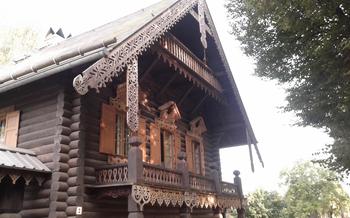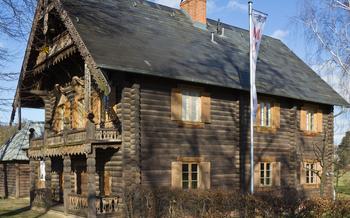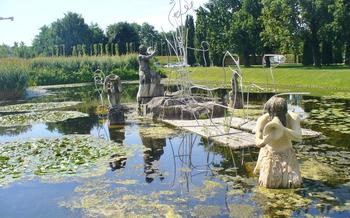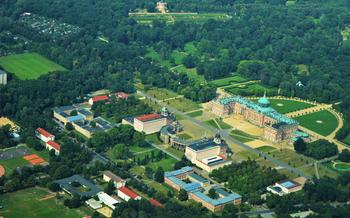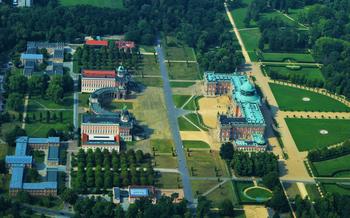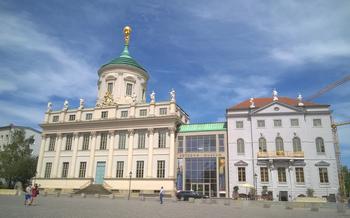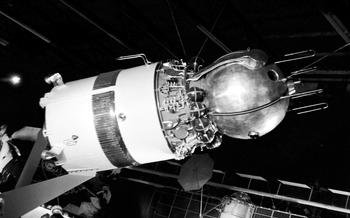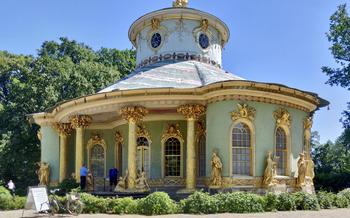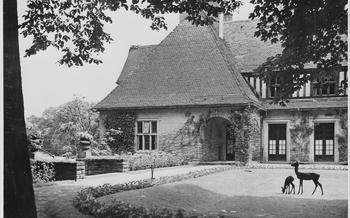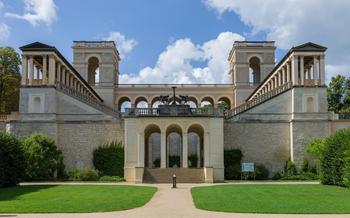
The Alexandrowka Museum in Potsdam
- The Alexandrowka Museum in Potsdam: A Unique Russian Village in the Heart of Germany
- Stepping Back in Time: Exploring the Authentic Russian Cottages
- Discovering the History of the Russian Colony
- Immersive Cultural Experiences: Russian Traditions and Craftsmanship
- Exploring the Surrounding Park and Gardens
- The Church of St. Alexander Nevsky: A Symbol of Russian Orthodoxy
- The Russian Cemetery: A Place of Remembrance and Reflection
- The Alexandrowka Museum Shop: Souvenirs and Cultural Treasures
- The Alexandrowka Choir: Preserving Russian Musical Traditions
- Special Events and Festivals at Alexandrowka
- Getting to the Alexandrowka Museum: Public Transportation and Parking
- Accessibility for Visitors with Disabilities
- Guided Tours for a Deeper Understanding
- Tips for Planning Your Visit to the Alexandrowka Museum
- Insider Tip: The Best Photo Spots at Alexandrowka
The Alexandrowka Museum in Potsdam: A Unique Russian Village in the Heart of Germany
The Alexandrowka Museum in Potsdam, Germany, offers a unique glimpse into a forgotten chapter of Prussian-Russian history. Nestled within the picturesque Sanssouci Park, the museum showcases a meticulously preserved Russian colony established by King Friedrich Wilhelm III in the 19th century to house the entourage of Russian Czar Alexander I.
Historical Background: The Alexandrowka colony was founded in 1826 as a gesture of gratitude and friendship towards Czar Alexander I, who had played a crucial role in the defeat of Napoleon during the Napoleonic Wars. King Friedrich Wilhelm III gifted the land to the Russian royal family, and twelve wooden houses were built to accommodate the Russian soldiers and craftsmen brought to Potsdam to construct the nearby Russian Orthodox Church of St. Alexander Nevsky.
Architectural and Cultural Significance: The Alexandrowka cottages, built in traditional Russian style, stand as living testimonies to the architectural and cultural exchange between Prussia and Russia. The houses feature intricate carvings, brightly painted facades, and traditional Russian roof designs. The colony also boasts a Russian Orthodox chapel, a schoolhouse, and a guesthouse, offering a comprehensive insight into the lives of the former Russian inhabitants.
Connection to the Prussian Royal Family: The Alexandrowka colony held a special place in the hearts of the Prussian royal family. King Friedrich Wilhelm III and his wife, Queen Louise, were fond of the Russian culture and frequently visited the colony, attending Russian Orthodox services and social gatherings. The colony's proximity to the royal residences in Potsdam further solidified its connection to the Prussian monarchy.
Stepping Back in Time: Exploring the Authentic Russian Cottages
The Alexandrowka Museum is home to a collection of authentic Russian cottages, each a unique and charming example of traditional Russian architecture. Built by skilled craftsmen using traditional techniques, these wooden houses exude a sense of history and craftsmanship that is truly captivating.
Strolling through the village, visitors can admire the intricate carvings, colorful decorations, and unique architectural features that adorn the cottages. The houses are arranged in a traditional Russian village layout, with a central square and winding lanes that lead to hidden courtyards and gardens.
Inside the cottages, visitors can step back in time and experience the lives of the former inhabitants. The interiors are furnished with authentic Russian furniture, textiles, and household objects, creating a vivid and immersive experience.
Guided tours and interactive exhibits provide visitors with insights into the history, culture, and traditions of the Russian settlers. Guides share stories about the families who lived in the cottages, their struggles and triumphs, and their contributions to the community.
The Alexandrowka Museum offers a unique opportunity to explore a living piece of Russian history and culture. Through its authentic cottages, immersive exhibits, and interactive experiences, the museum brings the past to life and allows visitors to connect with the rich heritage of the Russian people.
Discovering the History of the Russian Colony
The establishment of Alexandrowka was a strategic move by the Prussian king, Friedrich Wilhelm III, who sought to strengthen diplomatic ties with Russia, a rising power in Europe. The colony served as a symbol of friendship and cooperation between the two nations. The Russian settlers brought with them their unique culture, traditions, and craftsmanship, which enriched the cultural landscape of Potsdam.
Life in Alexandrowka was not without challenges. The settlers had to adapt to a new language, climate, and way of life. They also faced discrimination and prejudice from some segments of the Prussian population. Despite these difficulties, the Russian community preserved their identity and maintained close ties with their homeland.
The Alexandrowka Museum houses a wealth of historical documents and artifacts that shed light on the lives of the Russian settlers. Visitors can learn about their struggles, triumphs, and contributions to the development of Potsdam. Through interactive exhibits and guided tours, the museum offers a deeper understanding of the history and significance of the Russian colony.
Immersive Cultural Experiences: Russian Traditions and Craftsmanship
The Alexandrowka Museum offers visitors a unique opportunity to immerse themselves in Russian culture through traditional handicrafts workshops, folk music and dance performances, and authentic cuisine. Skilled artisans demonstrate their mastery of woodworking, pottery, and embroidery, allowing visitors to witness the intricate techniques that have been passed down through generations. The workshops provide an interactive experience, where visitors can try their hand at these traditional crafts and create their own souvenirs to take home. Folk music and dance performances bring the vibrant spirit of Russian culture to life, with energetic dances and melodious songs that showcase the rich traditions of the region. Visitors can also savor the flavors of authentic Russian cuisine, with traditional dishes prepared using fresh, local ingredients. Indulge in hearty soups, flavorful stews, and delectable pastries, all while learning about the culinary heritage of Russia. These immersive experiences offer a deeper understanding and appreciation of Russian traditions and craftsmanship, creating lasting memories for visitors to cherish.
Exploring the Surrounding Park and Gardens
Beyond the charming cottages and cultural exhibits, the Alexandrowka Museum offers visitors the opportunity to immerse themselves in the beauty of its surrounding park and gardens. Designed by renowned Prussian landscape architect Peter Joseph Lenné, the park is a masterpiece of naturalistic landscaping, seamlessly blending into the surrounding forest.
Strolling through the picturesque gardens, visitors are greeted by a symphony of colors and fragrances. Carefully manicured flower beds burst with an array of vibrant blooms, while towering trees provide shade and a sense of tranquility. The park's winding paths lead visitors through serene groves, past babbling brooks, and to hidden corners that offer breathtaking views of the surrounding landscape.
Sculptures and monuments scattered throughout the park add a touch of historical charm and intrigue. These works of art tell stories of the past, paying homage to the Russian settlers and their contributions to the cultural fabric of Potsdam. Whether it's a majestic statue of Tsar Alexander I or a poignant memorial to the fallen soldiers of the Russian Imperial Guard, each piece holds a unique significance that enriches the visitor's understanding of the site's history.
For those seeking a moment of peace and contemplation, the park offers numerous secluded spots to relax and soak in the tranquil atmosphere. Whether it's a bench nestled amidst a grove of trees or a secluded clearing overlooking the lake, there are plenty of opportunities to find solace and commune with nature.
The Church of St. Alexander Nevsky: A Symbol of Russian Orthodoxy
Standing proudly within the Alexandrowka Museum, the Church of St. Alexander Nevsky serves as a testament to the deep religious beliefs of the Russian settlers. Constructed in 1829, this striking church features a distinctive onion-shaped dome and intricate architectural details that reflect the rich traditions of Russian Orthodox architecture.
The church holds immense significance for the Russian community, serving as a spiritual and cultural center for generations. Throughout history, it has hosted countless religious services, baptisms, weddings, and funerals, becoming an integral part of the lives of the Russian settlers.
Beyond its religious significance, the Church of St. Alexander Nevsky stands as a cultural landmark, attracting visitors from around the world. Its well-preserved interior boasts exquisite iconography, ornate chandeliers, and a beautifully carved iconostasis, showcasing the artistic talents of Russian craftsmen.
Regular religious services and events are still held at the church, providing visitors with an opportunity to experience the vibrant spirituality and traditions of the Russian Orthodox faith. Whether you are a history buff, an architecture enthusiast, or simply seeking a moment of contemplation, the Church of St. Alexander Nevsky is a must-visit destination within the Alexandrowka Museum.
The Russian Cemetery: A Place of Remembrance and Reflection
The Russian Cemetery, located adjacent to the Alexandrowka Museum, is a poignant reminder of the lives and legacies of the Russian settlers. Here, visitors can pay their respects and learn about the stories behind the elaborate tombstones and memorials. The cemetery is the final resting place of prominent Russian figures, including soldiers, merchants, and artisans, who made significant contributions to the community.
Wandering through the cemetery's serene paths, visitors can discover the graves of those who shaped the history of Alexandrowka. Each tombstone tells a tale of lives lived in a foreign land, often filled with both challenges and triumphs. The inscriptions, written in both Russian and German, provide glimpses into the lives of these individuals and their families.
Guided tours of the cemetery are available, offering visitors a deeper understanding of the lives and experiences of the Russian settlers. These tours shed light on the challenges they faced, their contributions to the community, and the enduring legacy they left behind.
The Russian Cemetery serves as a place of remembrance and reflection, honoring the memory of those who helped establish and sustain the Russian community in Potsdam. It is a poignant reminder of the deep historical ties between Russia and Germany and a testament to the enduring spirit of the Russian people.
The Alexandrowka Museum Shop: Souvenirs and Cultural Treasures
At the Alexandrowka Museum Shop, visitors can immerse themselves in a treasure trove of authentic Russian handicrafts and souvenirs. These unique items provide a glimpse into the rich cultural heritage of the Russian colony and offer a chance to take a piece of Alexandrowka home.
Traditional Russian clothing and accessories, including intricately embroidered blouses, shawls, and hats, are available for purchase, allowing visitors to embrace the vibrant colors and patterns of Russian folk costumes.
For those interested in learning more about Russian history and culture, the museum shop offers a selection of books and publications that delve into the fascinating stories of the Russian settlers and their lives in Alexandrowka.
Proceeds from the museum shop directly support the preservation and maintenance of the Alexandrowka Museum, ensuring that future generations can continue to appreciate and learn from this unique cultural treasure. By purchasing a souvenir from the museum shop, visitors not only take home a memento of their visit but also contribute to the ongoing preservation of this historic site.
The Alexandrowka Choir: Preserving Russian Musical Traditions
The Alexandrowka Museum is not just a historical site; it's also a vibrant cultural center that keeps the spirit of Russian traditions alive. One of the highlights of the museum is the renowned Alexandrowka Choir, which has been preserving and performing traditional Russian folk songs and sacred music for over a century.
Founded in 1891, the choir consists of talented singers who are passionate about sharing the beauty and richness of Russian choral music. Their repertoire includes a wide range of traditional songs, from lively folk melodies to solemn religious hymns. The choir's performances are not only captivating but also educational, as they provide insights into Russian history, culture, and spirituality.
The Alexandrowka Choir has performed in prestigious concert halls and festivals worldwide, earning international acclaim for their exceptional artistry. They have also collaborated with renowned musicians and conductors, further showcasing the diversity and versatility of Russian choral music.
Visitors to the Alexandrowka Museum have the opportunity to experience the choir's enchanting performances firsthand. Concerts are held regularly throughout the year, and tickets can be purchased in advance or at the door. The choir's performances are a true highlight of any visit to the museum, allowing visitors to connect with the vibrant musical traditions of Russia.
Special Events and Festivals at Alexandrowka
The Alexandrowka Museum comes alive during its annual festivals and events, which celebrate Russian culture and heritage in all its glory. These special occasions offer visitors a unique opportunity to immerse themselves in traditional Russian customs, music, dance, and cuisine.
One of the highlights of the year is the Russian Summer Festival, held annually in June or July. This vibrant festival showcases the best of Russian culture, with traditional music and dance performances, folk art demonstrations, and a variety of food and drink stalls offering delicious Russian specialties. Visitors can also participate in interactive workshops, such as traditional crafts or cooking classes, and learn more about Russian history and traditions.
Another popular event is the Russian Orthodox Christmas, celebrated in January. The museum hosts a special service at the Church of St. Alexander Nevsky, followed by a festive celebration with traditional Russian carols, dancing, and a communal feast. Visitors can experience the warmth and joy of this important holiday and learn about its significance in Russian culture.
Throughout the year, the Alexandrowka Museum also hosts a variety of other events, such as concerts, exhibitions, and workshops. These events provide visitors with opportunities to learn more about Russian history, art, music, and literature, and to engage with the local Russian community. Whether you are interested in history, culture, or simply looking for a unique and enriching experience, the Alexandrowka Museum's special events and festivals are not to be missed.
Getting to the Alexandrowka Museum: Public Transportation and Parking
Reaching the Alexandrowka Museum is a breeze, whether you prefer the convenience of public transportation or the flexibility of driving your own car. If you're arriving by train, simply hop off at the Potsdam Hauptbahnhof (main station), where you can catch the 695 bus. The bus will take you directly to the Alexandrowka Museum stop, just a short walk from the museum entrance. The journey takes around 20 minutes, and tickets can be purchased on the bus.
For those who prefer to drive, the museum is easily accessible by car. Follow the signs to Potsdam and then to the Alexandrowka district. There are several parking options available near the museum, including designated parking spaces along the streets and a paid parking lot adjacent to the museum. Please note that parking fees may apply, so it's a good idea to have some change or coins on hand.
Accessibility for Visitors with Disabilities
The Alexandrowka Museum is committed to providing an inclusive and enjoyable experience for visitors of all abilities. Wheelchair users and visitors with mobility challenges can rest assured that the museum is well-equipped to accommodate their needs.
Designated parking spaces are available near the museum's entrance, ensuring easy access for visitors with disabilities. Additionally, the museum's pathways are paved and accessible, allowing for smooth navigation throughout the grounds.
For those who require assistance, the museum staff is always ready to lend a helping hand. They can provide wheelchairs upon request and offer guidance to ensure a comfortable and stress-free visit.
The museum's exhibits and interactive displays are designed to be accessible to visitors of all abilities. Braille signage and audio guides are available for visually impaired visitors, and staff members are trained to provide assistance to those with hearing difficulties.
With its commitment to accessibility, the Alexandrowka Museum ensures that everyone can enjoy and appreciate the rich history and cultural heritage of this unique Russian village in the heart of Germany.
Guided Tours for a Deeper Understanding
Venturing into the Alexandrowka Museum with a knowledgeable guide is like embarking on a journey through time. These experts bring the history of the Russian colony to life, shedding light on the lives of its former inhabitants, the diplomatic relations between Russia and Prussia, and the challenges faced by the settlers.
Guided tours are available in various formats, catering to different interests and group sizes. Whether you prefer an intimate private tour or the camaraderie of a group exploration, there's an option to suit your preferences. The cost of guided tours varies depending on the size of the group and the duration of the tour.
Booking a guided tour in advance is recommended to secure your spot, especially during peak tourist season. You can make reservations online or by contacting the museum directly. The benefits of having a guide extend beyond historical insights. They can provide personalized recommendations, answer your questions, and offer a deeper understanding of the museum's exhibits and artifacts.
With a guided tour, you'll gain a richer and more meaningful experience at the Alexandrowka Museum. These knowledgeable guides will transform your visit into an immersive journey through the history and culture of this unique Russian village in the heart of Germany.
Tips for Planning Your Visit to the Alexandrowka Museum
To make the most of your visit to the Alexandrowka Museum, careful planning is key. Consider visiting during the warmer months, from April to October, when the gardens are in full bloom and the weather is pleasant for outdoor exploration. Aim to arrive early in the morning or late afternoon to avoid crowds and to fully immerse yourself in the tranquility of the site.
Pack comfortable shoes for walking, as you'll be exploring cobblestone paths and uneven terrain. Remember to bring a camera to capture the picturesque cottages, gardens, and monuments. Please be mindful of photography guidelines and respect the privacy of other visitors when taking photos.
Finally, take your time to explore the museum at your own pace. There's no rush to see everything in one go. Soak in the atmosphere, engage with the exhibits, and allow yourself to be transported back in time as you discover the fascinating history and culture of the Alexandrowka colony.
Insider Tip: The Best Photo Spots at Alexandrowka
To truly capture the essence of the Alexandrowka Museum, venture off the beaten path and discover hidden gems that offer unique perspectives. For breathtaking shots of the wooden cottages, find secluded corners where you can photograph them against a backdrop of lush greenery. The vibrant colors of the gardens provide a stunning contrast to the neutral tones of the cottages, creating a picturesque composition. To capture the grandeur of the Church of St. Alexander Nevsky, position yourself at an angle that showcases its intricate architectural details against the backdrop of the surrounding trees. Don't miss the opportunity to capture the serene beauty of the Russian Cemetery, where elaborate tombstones and memorials create a poignant and atmospheric setting. Share your stunning photographs on social media using #AlexandrowkaMuseum to inspire others to embark on their own journey of discovery at this hidden gem in Potsdam.
